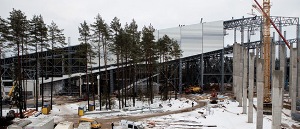Mar 7 2011
Algirdas Stasiukynas, general director of the Lithuanian construction company Skirnuva, follows the progress of a construction project near the small town of Druskininkai in Lithuania. The air is cold, but Stasiukynas isn’t referring to the normal winter weather.
“The temperature has to remain below zero. Sandwich panels to totally insulate the heat are the most important thing when building an indoor downhill skiing complex. The heat and cold must never meet, even if summer temperatures reach 30C.”
 The skiing weather is brilliant when panels keep the cold inside and steel makes the slopes undulate.
The skiing weather is brilliant when panels keep the cold inside and steel makes the slopes undulate.
Stasiukynas is speaking about one of the largest indoor downhill skiing complexes in Europe which is approaching its final size on the company’s bustling construction site. Skirnuva has every confidence in Ruukki’s solutions since cooperation has been successfully tested over the years – Ruukki guarantees that the panels are climate proof.
Externally, the panels are the most visible part of the extensive snow centre spreading along the banks of the Nemunas river. The investor, together with the architects office and supplier, decided on various shades of grey as the choice of colour.
Exceptionally challenging project
Skirnuva, which has become one of the top construction companies in Lithuania, took to Ruukki’s steel roofs already during the initial stages of its operations.
“We were still a small company and virtually a beginner on the market. We found Ruukki to be a reliable, stable partner,” Algirdas Stasiukynas says.
He describes the downhill skiing complex as an exceptionally challenging project. There are no examples in neighbouring countries and this is why smooth cooperation between the constructor and the panel supplier is particularly important.
Natural feel of snow
At this stage in the project, the downhill ski slope is still glistening with undulating steel rather than snow. Andrius Stasiukynas – managing director of Skirnuva’s subsidiary Stamita and also Algirdas Stasiukynas’s son – walks around deep inside the spacious complex.
“The slope has been covered with Ruukki’s load-bearing corrugated sheets. The sheets were covered and thanks to the cooling pipes installed in them, the snow stays on the slope. The snow must feel as natural as possible,” Andrius Stasiukynas explains.
Above, Ruukki’s steel purlins support the roof, which consists of panels. A total of 900 tonnes of Ruukki’s frame were ordered for the entire project.
The Stasiukynases reckon that the euphoria of snow could attract as many as 400,000 visitors a year. People also come to the town to enjoy the acclaimed services of the historical Druskininkai spa.
“Because the project has EU funding, there was no room for extensive negotiations as construction progressed. A large company like Ruukki can meet tight schedules,” the general director says.